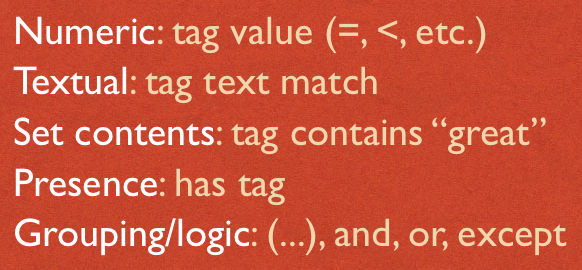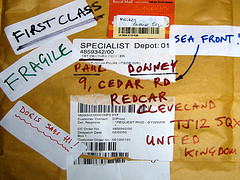I’ll have to explain what I mean by that, especially seeing as some people got the impression from the earlier post on data vs metadata that we don’t think metadata is important, or that it doesn’t exist, or similar. I tried to make it clear in the post, and in responding to the comments that followed, that that’s not what was meant: In fact that’s one of the major initial goals of Fluidinfo – to be a metadata engine for everything. So that’s how important we think metadata is! The way to support metadata on anything is to have an underlying architecture that’s flexible enough to allow that to happen – without someone setting the thing up with an a priori determination of what’s meta- and what’s not. True support for metadata is too important for that – to do it properly you need the architecture to be neutral.
The question is: how can Fluidinfo be used as a universal metadata engine?
Metadata can be loosely defined as data that’s about other data. So to provide a universal metadata engine, any time any application wants to store some metadata (M) about anything (A), Fluidinfo should always have a place to put M. Moreover, the application shouldn’t have to stop to ask if it’s ok to store the metadata, and its needs shouldn’t have to be anticipated.
The key word in the above paragraph is about. Fluidinfo has an about tag that can (optionally) be added to objects to indicate what they’re about. There’s a lot that could be said about the about tag – in fact, the person who pushed for its inclusion in Fluidinfo, Nicholas Radcliffe even started a blog of that name. The main thing to know for now is that the about tag on an object (if any), is immutable and its value (always a string) is unique across all Fluidinfo objects.
To give some simple examples, there might be objects in Fluidinfo with about tags that have values such as isbn:140679239X or http://www.abebooks.com/servlet/BookDetailsPL?bi=588210745 or US:ZIP:90210 or info@fluidinfo.com or IP:207.171.166.252 or….. anything you like. That’s the point.
So when an application – any application – wants to store information about A, it just asks Fluidinfo for the object whose about tag has the value A. If the object already exists, Fluidinfo returns it. If not, Fluidinfo creates a new object, sets its about value to A, and returns it.
That’s the first part of being a universal metadata engine: if you want to store information about something, Fluidinfo gives you an obvious place to put that information (provided you can convert your particular A into a string of some kind). In this regard, Fluidinfo is like a wiki. When you use a wiki, you can ask it for the page on any subject, and if it doesn’t exist it will be created. As with a wiki, you can think of Fluidinfo as already having objects about everything; just like a wiki, Fluidinfo doesn’t actually create any particular object until someone asks for it.
The second crucial component is Fluidinfo’s model of control. As mentioned in the Information. Naturally. post, Fluidinfo objects do not have owners. That means that all applications are guaranteed that they can store information onto the Fluidinfo object about A.
Putting these two together, you get something that starts to look very much like a universal metadata engine. Got some metadata to store about something? Fluidinfo gives you an obvious place to put it and a guarantee, in advance, that you’ll be able to do so. This is what we mean when we say Fluidinfo makes the world more writable.
To give a couple of quick examples, Emanuel Carnevale has written two Javascript programs for the Firefox 3.5 Jetpack extension. These are just quick proofs of concept for now, but they will mature. One is fluidy-hood that offers functionality along the lines of Google’s Sidewiki (though more general), and the second is BRB, the Borthwick Remember Button, in honor of John Borthwick of Betaworks who asked for one. These are very simple pieces of code that use Fluidinfo as a universal metadata engine, in both cases putting information onto the object that’s about the URL you’re currently looking at in Firefox.
A final comment about the creation of value: These tiny apps have limited and unremarkable value to their individual users. Things get much more interesting though we you consider that these applications are creating truly social data. It is directly searchable via the Fluidinfo query language. It can be combined with other information—homogenous (created by the same app being run by someone else) and heterogenous (related but different information about the same thing created by other apps). It can be accessed, augmented, and mashed up by others. And the person who created the information can continue to control it: share it, protect it, edit it, delete it, etc.
When you look at data and applications like this, you begin to see why we’re so excited about the kinds of changes in how we work with information that we think Fluidinfo can help to introduce.
There’s a lot more that can be said regarding the about tag, about how all this affects customization, personalization, and information organization in general, about ambiguity and its resolution, and about the creation of value via putting information into context. Those things will have to wait for later blog postings, though.
Stay tuned.









